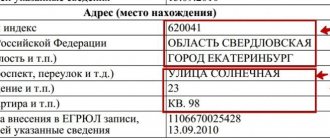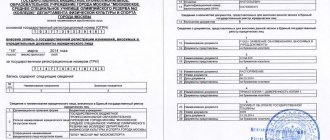- What to name the organization
- Restrictions on the name of a legal entity
- What letters (lowercase or capital) can the name of a legal entity be indicated in the charter?
- The concept of “name of a legal entity” in the Law of 05.05.2014 No. 99-FZ “On Amendments to Chapter 4 of Part 1 of the Civil Code of the Russian Federation”
- useful links
This article is written as part of a step-by-step guide to registering a business yourself:
- How to register an individual entrepreneur (PBLE) and an LLC with the tax office yourself
- Preparation and execution of necessary documents for registration.
- Registration of an LLC (CJSC, OJSC) or individual entrepreneur with the tax office
- When is it not necessary to register an individual entrepreneur?
- Registration of LLC (CJSC, JSC) or individual entrepreneur in the Pension Fund of the Russian Federation, Compulsory Medical Insurance Fund, Social Insurance Fund, Rosstat)
- Making a seal.
- Opening a bank account
- Registration of changes in the charter, constituent documents, Unified State Register of Legal Entities
- Change of director and amendments to the Unified State Register of Legal Entities on his passport data
- Reorganization of a legal entity
- Methods for liquidating an organization
What to name the organization
Perhaps the answer to the question of what to name an organization is both the simplest and the most complex.
On the one hand - what’s easier - I took whatever came to hand or what I had long dreamed of, or, for example, the name of my beloved girl (as was fashionable in the 90s) and the name of the legal entity (LLC "Nadezhda" or "Romashka" ) ready.
On the other hand, if you start to think about the meaning of the name of the organization, then you begin to understand that it will be better if it “kills” several “birds with one stone.” Therefore, it is advisable that the name of the organization:
- memorable (so that people can remember (and then find) your organization by name);
- was (if possible) unique (after all, it is easier for people to find later, for example, than an organization with the name “Phobos.” And tax inspectorates do not now check for the uniqueness of the name (unlike the procedure previously in force in some regions);
- carried an additional element of advertising;
- it was not too long, for example, such as “Sevzapmorpromopttorg”;
- It is better to name the organization so that its profile of activities is clear from its name;
- also took into account various elements of logic, everyday rationality and wisdom, superstitions and omens. For example, a car repair organization called “Wrecked” is unlikely to be doomed to success. Therefore, we must take into account what is aptly noted in the words of folk wisdom: “Whatever you call the boat, that’s how it will float.”
Restrictions on the name of a legal entity
To this we can add legislative restrictions on the name of a legal entity:
- The name of a legal entity must contain an indication of its organizational and legal form. Behind these incomprehensible words is that the name of any commercial organization must contain the words: LLC, CJSC, OJSC; non-profit: homeowners association, public organization, foundation, etc.
- In cases established by law, the names of commercial organizations must contain an indication of the nature of the activities of the legal entity. So according to:
- Article 3 of Law No. 380-FZ dated December 3, 2011 “On Business Partnerships”, according to which the corporate name of the partnership must contain its name and the words “ economic partnership ”;
- Clause 13 of Article 5 of the Law “On Clearing and Clearing Activities”, the use of the word “ clearing ”, words derived from it and combinations with it in their corporate name by other legal entities other than clearing organizations is not allowed;
- Clause 9 of Article 5 of the Law “On Microfinance Activities and Microfinance Organizations” no legal entity in the Russian Federation, with the exception of legal entities included in the state register of microfinance organizations, may use the phrase “ microfinance organization ” in its name;
- According to paragraph 3 of Article 9 of the Law “On Organized Trading”, the trade name of the exchange must contain the word “exchange”. The use of the word “ exchange ”, words derived from it and combinations with it in their corporate name and (or) in advertising by other persons is not allowed, with the exception of the use by relevant organizations in their name and (or) in advertising of the phrase “labor exchange”;
- Clause 4 of Article 15 of the Law “On Credit Histories”, no legal entity in the Russian Federation, with the exception of legal entities operating as credit history bureaus or associations (unions) of credit history bureaus, may use the words “credit history bureau » or otherwise indicate that the legal entity has the right to carry out such activities;
- Article 7 of the Law “On Banks and Banking Activities”, no legal entity in the Russian Federation, with the exception of a legal entity that has received a license from the Bank of Russia to carry out banking operations, may use the words “bank ” , “ credit organization ” or otherwise indicate that this legal entity has the right to carry out banking operations.
- The names “Russia”, “Russian Federation”, the word “federal” and words and phrases formed on their basis are used in the name of a legal entity with the permission of the Government Commission.
- The use of the word “Moscow” and words and phrases formed on its basis (including abbreviations), as well as the names of districts of the city of Moscow and words and phrases formed on their basis in the name of a legal entity is possible only with the permission of the Interdepartmental Commission of the Moscow Government for the issuance of permits for the right to use state symbols of the city of Moscow.
- The name of the organization should not contain full or abbreviated official names:
foreign states, as well as words derived from such names;
- federal government bodies, government bodies of constituent entities of the Russian Federation and local governments;
- international and intergovernmental organizations;
- public associations;
What documents are needed to register a newly created legal entity?
The answer to this question is given in Art. 12 of the Law “On State Registration of Legal Entities...” dated 08.08.2001 No. 129-FZ. The list includes:
- Application for state registration of a legal entity. Its form is approved by Appendix 1 to the order of the Federal Tax Service dated January 25, 2012 No. ММВ-7-6/ [email protected]
- Minutes of the meeting of founders or other document containing the decision to create a legal entity.
- 1 copy of the organization’s constituent document. An exception is cases when an organization is created using the standard charter provided for in Art. 12 of the Law “On LLC”.
- Receipt for payment of state duty. In clause 1, part 1, art. 333.33 of the Tax Code of the Russian Federation determines the amount - 4,000 rubles. You can pay the receipt on the official website of the tax service service.nalog.ru or on the government services portal (in this case, the amount of the state duty is reduced by 30%. From 01/01/2019, payment of the state duty will not be required if registration documents are submitted electronically (see the law “On the introduction of changes..." dated July 29, 2018 No. 234-FZ).
Foreign legal entities - founders will be required to provide proof of their status: an extract from the relevant register of the country of origin or another similar document.
If the documents are submitted properly, then after 3 days the applicant will receive the charter and a document confirming the fact of registration in the Unified State Register of Legal Entities in electronic form. If desired, you can obtain paper documents from the regorgan confirming the contents of the electronic ones.
To register a legal entity, you will need to personally submit the specified package of documents to the territorial tax authority or through the MFC. This can also be done remotely by sending a registered letter by mail or through the State Services portal.
You can find more complete information on the topic in ConsultantPlus. Full and free access to the system for 2 days.
IMPORTANT! As of 06/05/2014, the obligation to pay 50% of the authorized capital upon registration of an LLC has been abolished, which means that a certificate about this is not required. Read more about this in the article Contribution of authorized capital when registering an LLC.
Article 54. Name, location and address of a legal entity
(as of 07/01/2018)
← Article 532. Affiliation | Article 56. Liability of legal entities. faces → |
| Revision of Art. 54 Civil Code of the Russian Federation until 01.09.2014 | Revision of Art. 54 of the Civil Code of the Russian Federation from 01.09.2014 (as amended by Law No. 99-FZ) |
Requirements for a company name are established by this Code and other laws. Rights to a company name are determined in accordance with the rules of Section VII of this Code. |
Inclusion in the name of a legal entity of the official name Russian Federation or Russia, as well as words derived from this name, is permitted in cases provided for by law, decrees of the President of the Russian Federation or acts of the Government of the Russian Federation, or by permission issued in the manner established by the Government of the Russian Federation . Full or abbreviated names of federal government bodies cannot be used in the names of legal entities, except in cases provided for by law, decrees of the President of the Russian Federation or acts of the Government of the Russian Federation. Regulatory legal acts of the constituent entities of the Russian Federation may establish a procedure for using the official name of the constituent entities of the Russian Federation in the names of legal entities. A legal entity bears the risk of the consequences of failure to receive legally significant messages (Article 1651) delivered to the address indicated in the unified state register of legal entities, as well as the risk of the absence of its body or representative at the specified address. Messages delivered to the address specified in the Unified State Register of Legal Entities are considered received by the legal entity, even if it is not located at the specified address. If a foreign legal entity has a representative on the territory of the Russian Federation, messages delivered to the address of such representative are considered received by the foreign legal entity. Requirements for a company name are established by this Code and other laws. Rights to a company name are determined in accordance with the rules of Section VII of this Code. |
Commentary on Article 54 of the Civil Code
Article 54 of the Civil Code contains general provisions on the legal regime of the name, location and address of a legal entity. Each legal entity, regardless of any criteria, must have a name (for commercial organizations - a company name), location and address, which are indicated in the constituent documents (charter, constituent agreement).
Paragraph 1 of Article 54 of the Civil Code contains the only requirement for a name - an indication of its organizational and legal form. The names of non-profit organizations must indicate the nature of the activities of the legal entity.
The location of a legal entity is established at the location of its permanent executive body. Clause 2 of Article 54 of the Civil Code specifies the place of state registration of a legal entity, which is determined on the territory of the Russian Federation by indicating the name of the locality (municipal entity). According to Art. 13 of Federal Law No. 129-FZ “On State Registration of Legal Entities and Individual Entrepreneurs”, state registration of legal entities upon their creation is carried out by registration authorities at the location of the permanent executive body, in the absence of such a body - at the location of another body or person, having the right to act on behalf of a legal entity without a power of attorney.
For most organizations (JSC, LLC, unitary enterprises, non-profit organizations), such a body is the sole executive body - the head (director, general director, manager, etc.). It is he who, unlike the collegial executive body, acts on a permanent basis and without a power of attorney.
The location may also include the address of the residential premises where the head of the organization lives. According to Part 2 of Art. 17 of the RF Housing Code, it is permitted to use residential premises for carrying out professional activities or individual entrepreneurial activities by citizens living there legally, if this does not violate the rights and legitimate interests of other citizens, as well as the requirements that the residential premises must meet.
It is the address of the permanent executive body of a legal entity that must be reflected in the Unified State Register of Legal Entities for the purpose of communicating with the legal entity. All other addresses (postal, legal, etc.) have no legal significance. When registering a legal entity, the tax authority has the opportunity to verify the address information specified in the application for tax registration and in the constituent documents. All other addresses are indicated by the legal entity independently and are not subject to verification for accuracy. In both public and private relations, correspondence to a legal entity should be sent only to the address indicated in the extract from the Unified State Register of Legal Entities.
The law does not require the submission of documents confirming that the executive body is actually located at the specified address. The registration authority does not have the right to refuse state registration on the basis that the premises or building, the address of which is indicated for the purposes of communication with a legal entity, is unsuitable for carrying out the activities of the legal entity as a whole or the type of activity specified in the documents submitted for state registration. At the same time, registration at the address of a residential property is permissible only in cases where the owner of the property has given consent to this. Consent is assumed if the named address is the address of the place of residence of the founder (participant) or a person who has the right to act on behalf of a legal entity without a power of attorney (clause 4 of the Resolution of the Plenum of the Supreme Arbitration Court of the Russian Federation of July 30, 2013 No. 61).
Brand names have the following characteristics:
- purpose - individualization of the subject - commercial organization;
- it must be constant and unchanging;
- it must give a truthful description of her;
- The exclusive right to a company name is subject to protection from the date of state registration of the legal entity. The Civil Code does not provide for any special registration of a company name specified in the constituent documents of a legal entity;
- the right to a company name is of an indefinite nature and is valid until the termination of the legal entity;
- the right to a company name arises only from a legal entity that is a commercial organization, therefore the prohibitions contained in paragraph 4 of Article 54 of the Civil Code do not apply to non-profit organizations;
- a legal entity can have only one company name;
- The exclusive right to a company name cannot be the subject of transactions.
The main updates are as follows:
- Finally, at the level of a codified law, a ban is introduced on the use of the names “Russian Federation” and “Russia” in the names of organizations, as well as words derived from this name, as well as the names of government bodies.
- It follows from paragraph 4 of Article 54 of the Civil Code that the legislator, distinguishing between the concepts of “organization name” and “company name of the organization,” introduces a mandatory requirement that both of these names be contained in the charter.
By introducing new mandatory requirements for the name of an organization, the legislator for the first time wisely took care of the rules for bringing documents into compliance with the new requirements by introducing the rule that the constituent documents and names of legal entities created before the entry into force of the Project must be brought into compliance with the requirements of the new legislation when the first amendment to the constituent documents .
Read more about creating an organization:
- Location of the organization
- Constituent documents for registration of a legal entity
- Filling out application P11001, P21001
- Submitting documents to the tax office
The article was written and posted on February 5, 2012. Added - 03/27/2014, 05/09/2014, 07/27/2015, 07/05/2017, 09/26/2019
ATTENTION!
Copying the article without providing a direct link is prohibited. Changes to the article are possible only with the permission of the author.
Author: lawyer and tax consultant Alexander Shmelev © 2001 — 2020
www.online-document.ru
And so, in order to legally work as a legal entity (organization), you need to register with the branch of the Federal Tax Service of the Russian Federation at the place of registration.
STEP 1. PREPARATION AND CHECKING THE PACKAGE OF DOCUMENTS
Pay special attention to the entered dates, as well as the correct spelling of personal and address information.
To do this you need the following documentation package :
1. Application for registration of an LLC (form P11001) - printed in one copy.
The application is signed directly at the tax office in the presence of all applicants.
To those founders who will not be able to personally attend the submission or receipt
documents, you must have your signatures certified by a notary. Stitch application sheets
no need.
2. Minutes of the meeting of founders (decision of the sole founder) - printed
in one copy. The minutes must contain the signatures of all meeting participants,
chairman, secretary (if there are legal entities among the founders of the LLC
additionally you need to affix their stamps). The decision only requires a signature
sole founder. If the protocol (decision) contains more than one
pages, then they need to be stitched.
3. Establishment agreement – drawn up if the LLC has two or more founders. In law
the agreement does not need to be submitted to the tax registration office, but, unfortunately, not in all Federal Tax Service Inspectors
they know about it, so in order not to waste extra time and nerves, take it with you.
The agreement is printed in several copies (one for the tax office and one for
each founder) and signed by all founders. If the document turned out
more than one sheet, it must be stitched.
4. Charter of the organization - printed in two copies. Sign and flash
There is no need for a charter page.
5. Application for switching to the simplified tax system - completed if you plan to use the simplified tax system.
The application is printed in two copies (if registration takes place in Moscow - in
three copies) and signed by the applicant.
STEP 2. PAYMENT OF STATE DUTIES
The state fee for registering an LLC is 4,000 rubles . Generate a receipt and
You can pay for it online using the service on the official website of the Federal Tax Service. Except
This means you can print out a receipt and pay for it at any convenient Sberbank branch.
Save the document confirming payment; you will need it when checking documents at
tax inspectorate.
Please note that the payment date in the state duty receipt must be later than the date of signing
minutes of the general meeting (decision of the sole founder). The point is that first always
a decision or protocol on the creation of an organization is made and signed, and only then
state duty is paid.
STEP 3. SUBMITTING DOCUMENTS
The final set of documents should include:
1. Application in form P11001 – 1 copy.
2. Minutes of the general meeting (decision of the sole founder) – 1 copy.
3. Establishment agreement – 1 copy.
4. Charter of the organization - 2 copies.
5. Original receipt of state duty with a note about payment.
6. Letter of guarantee from the owner of the legal address confirming it
intention to enter into a lease agreement with the company after registering the LLC.
7. Application for transition to the simplified tax system – 2 copies (for Moscow – 3 copies).
Documents must be submitted to the registering Federal Tax Service at the legal address of the company.
The address and contact details of your inspection can be found using this service.
All founders must be present when submitting documents (except in cases where
they have their signature certified by a notary). Each of them is a must have
yourself a passport . If the general director is not a founder (applicant), then he is not
It is obligatory to be present at the registration of the LLC.
If the founders submit documents for registration in person , it is necessary:
1. Hand over a set of documents to an employee of the Federal Tax Service.
2. In the presence of an employee, each founder should write his last name, first name, patronymic and
sign the application for LLC registration (form P11001).
3. Receive a receipt confirming the delivery of documents (with signature, seal and date,
when you need to come for the finished LLC documents).
4. Receive one copy of the notice of transition to the simplified tax system with the date, signature and seal
employee of the Federal Tax Service (he may be useful to you in the future if disputes arise
questions).
To submit documents through a representative or send by mail , it is necessary to certify and
submit an application from the notary in form P11001 (during this procedure you must
all founders with passports will be present). In addition, you will need minutes of the meeting.
(decision) and charter. Additionally, it is necessary to issue a collective certificate for the applicant
notarized power of attorney to submit and receive documents (refusal).
STEP 4. OBTAINING LLC DOCUMENTS
On the date indicated by the employee, you need to come to the tax office for ready-made
documents (from 2020, the registration period for an LLC should not exceed 3 working days ). To the applicant
You must have a passport and a receipt with you (the representative additionally needs
notarised power of attorney).
Note, if you cannot come to pick up the documents on the specified day, they will be sent by mail.
In case of successful registration, the inspector must issue the following documents:
1. Certificate of registration of the LLC with the tax office (with OGRN, INN, KPP number).
2. One copy of the bound charter with the mark of the registering authority.
3. Unified State Register of Legal Entities sheet.
Note, from January 1, 2020, the Federal Tax Service stopped issuing certificates of state
LLC registration. Instead of the specified document, the tax office draws up a Unified State Register of Legal Entities, which
has the same legal force as the previously issued certificate.
Be sure to check the information in the documents you receive. If errors are found
Immediately contact the employee who issued the documents to draw up a protocol of disagreements.
If errors were made due to the fault of the registering tax office, they must promptly and
free fix.
STEP 5. REGISTRATION WITH FUNDS
The tax office independently sends information about newly registered LLCs to
Pension Fund, Rosstat and other extra-budgetary funds. Certificates of registration with
funds must be given to you along with the constituent documents or sent by mail.
If this does not happen, you can personally visit the relevant fund and get
Required documents. This is not required by law, but information from these documents
You may find it useful in the process of entrepreneurial activity.
STEP 6. ACTIONS AFTER REGISTRATION
After registering an LLC, you must:
• Conclude an employment contract with the manager.
• Sign the order to take office.
• Compile a list of LLC participants.
• Contribute the authorized capital no later than 4 months from the date of registration of the LLC.
• Submit information on the average number of employees no later than the 20th
the month following the month in which the LLC was registered.
You may also need (depending on the activities of the LLC):
• Make a seal.
• Open a bank account.
• Purchase and register a cash register.
• Obtain a license.
Useful links on the topic “Name of organization (name of legal entity)”
- Exclusion from the Unified State Register of Legal Entities of inactive legal entities
- Extract from the Unified State Register of Legal Entities
- Addresses, telephone numbers, websites, details of tax inspectorates of St. Petersburg
- Addresses, telephone numbers, websites, details of Moscow tax inspectorates
- Addresses of tax inspectorates (other cities in Russia)
- How to pay taxes and submit reports?
- Tax reporting for the general tax regime
- Tax reporting for a simplified taxation system
- Tax reporting for the tax system in the form of UTII
- Tax liability for failure to submit a tax return
- Tax liability for unpaid taxes
- Tax liability for failure to appear when called to the tax authorities








